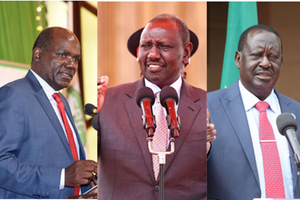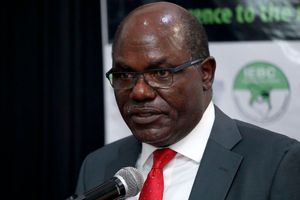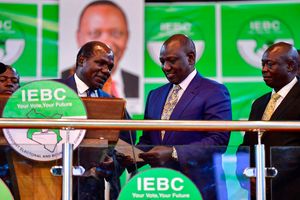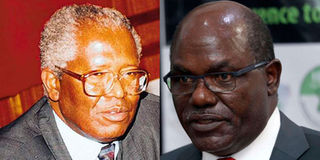
Defunct Electoral Commission of Kenya Chairman Samuel Kivuitu who died in 2013 (left) and former Independent Electoral and Boundaries Commission chairman Wafula Chebukati who died on February 20, 2025.
Electoral referees Samuel Kivuitu and Wafula Chebukati perfectly illustrate how two people can handle similar high-stakes jobs and situations differently in Kenya’s intense political scene.
Mr Kivuitu passed away on February 25, 2013, at MP Shah Hospital at the age of 75 after battling throat cancer, while Mr Chebukati died on February 20, 2025, at the age of 63.
Mr Kivuitu headed the now-defunct Electoral Commission of Kenya and oversaw the 1997, 2002, and 2007 general elections after replacing the controversial Zacchaeus Chesoni as chairman. His waterloo was the 2007 presidential ballot, won by incumbent President Mwai Kibaki but disputed by opposition leader Raila Odinga, leading to the post-election violence and subsequent reforms. He also presided over the 2005 referendum, in which the draft constitution was rejected.
For his part, Mr Chebukati oversaw two elections in 2017 — a presidential election which was nullified by the Supreme Court and a repeat presidential vote — as well as the 2022 polls.
Both men were highly respected lawyers and had political backgrounds.
During their tumultuous tenures, they were called upon to apply the law as it was written while also navigating the complexities of politics.
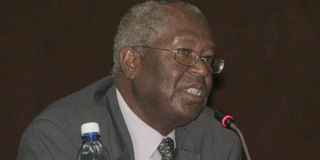
Electoral Commission of Kenya chairman Samuel Kivuitu. Photo/FILE
Educated in Uganda and Tanzania, Mr Kivuitu was an MP in the 1970s but failed in attempts to recapture his seat in the 1980s before retreating to his legal practice.
Mr Chebukati, also a lawyer with his own firm, went for the Saboti parliamentary seat in 2007 on an Orange Democratic Movement ticket but lost, coming second to Mr Eugene Wamalwa.
General Election
While Mr Kivuitu presided over the most controversial General Election in Kenya's history, which led to the 2007 post-election violence, Mr Chebukati went down in history as the only elections boss whose poll had been nullified by the Supreme Court. He also presided over an electoral commission that was split down the middle in 2022, after four commissioners disagreed with the results he announced while two were on his side.
Mr Kivuitu’s tenure saw six Kenyan citizens, including former President Uhuru Kenyatta and current President William Ruto, charged at the International Criminal Court (ICC).
Political analysts agree that neither Mr Kivuitu nor Mr Chebukati was inherently flawed; rather, they were unfortunate to serve as electoral referees in a highly contentious political environment where every candidate and their supporters refused to accept the possibility of losing.
“You cannot be an electoral referee in an election featuring the likes of Mwai Kibaki, William Ruto, Uhuru Kenyatta and Raila Odinga and expect it to be easy. Even the 2027 election will be a battlefield,” says Jomo Kenyatta University of Agriculture and Technology lecturer Charles Mwangi.
But while Mr Chebukati was considered calm and measured in his words, Mr Kivuitu was given to outbursts and light-hearted comments that critics considered inappropriate in tense moments like in 2007.
Political commentator Prof Peter Kagwanja observes that Mr Chebukati found himself in a situation similar to Mr Kivuitu’s in 2007.
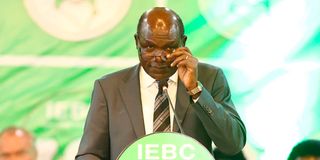
Former Independent Electoral and Boundaries Commission (IEBC) Chairman Wafula Chebukati speaks to the media at the Bomas of Kenya on August 10, 2022.
“In both cases, the election results were closely contested. The side declared the loser had nearly 50 per cent of the vote, just like the declared winners. The difference lay in how the referee communicated,” Prof Kagwanja said.
While Mr Chebukati remained tight-lipped and cautious as political tensions escalated in August 2022, Mr Kivuitu made what were considered reckless public statements that inflamed emotions.
“I acted under pressure... I announced the results of the fiercely contested presidential election under pressure,” Mr Kivuitu later admitted after the 2007 polls, in which he declared Mwai Kibaki the winner.
Mr Kibaki was then sworn in by Chief Justice Evan Gicheru under near darkness. The extent of Mr Kivuitu’s failure to manage his words under pressure was captured in his response when later asked if Mr Kibaki had indeed won the election.
State House
“I do not know whether Kibaki won the election,” he said.
This came after an earlier statement before he announced the 2007 results where he remarked about delays by some election officials to get to Nairobi, “I don’t know what they are doing with the results; maybe they are cooking them.”
Before violence erupted across the country, Mr Kivuitu admitted: “I took the presidential election winner’s certificate to State House, Nairobi, after some people threatened to collect it themselves, yet I am the one mandated by law to do so. When I arrived, I found the Chief Justice already there, ready to swear him in.”
Similarly, in 2022, Mr Chebukati reported being under immense pressure from politicians, top security officials, and voters to announce the results in a certain way.
Some of his commissioners had rebelled, taking partisan positions and further aggravating tensions. When Mr Chebukati finally announced the results at Bomas of Kenya, four commissioners disowned them, claiming that the declaration of Dr Ruto as the winner was “fiction.”
Both Mr Kivuitu’s and Mr Chebukati’s tenures attracted immense interest in the high-pressure role.

